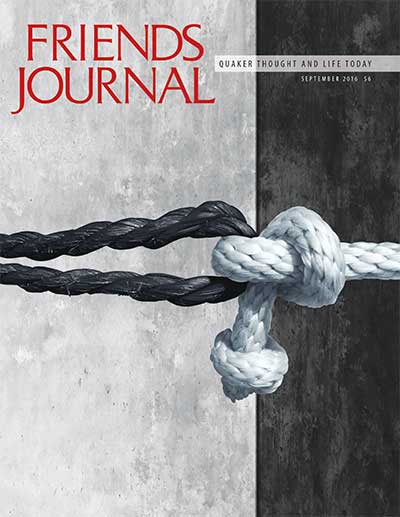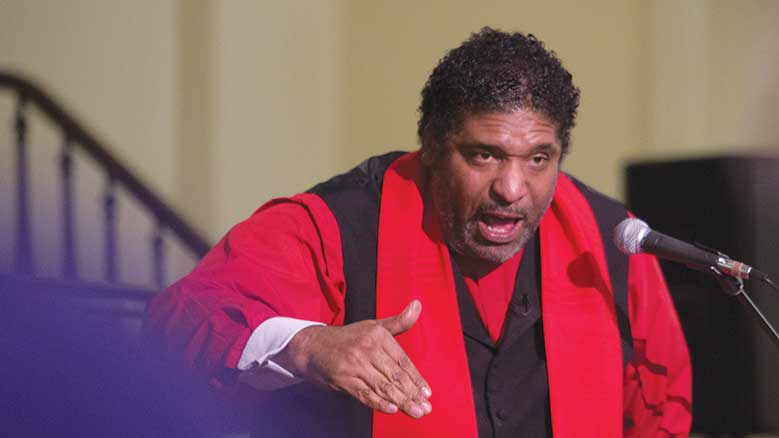During the past two years I have become much more interested in criminal justice reform as a result of visiting an inmate serving a life sentence, seeing how greatly he has changed, and hearing about others who have also made positive changes in their lives. Throughout this time I have wondered what Quakers might do to support criminal justice reform that would also contribute to ending the racial bias inherent in the current system.
Recently, I was asked if I knew that slavery was still legal in the United States. Of course I said no, that’s not possible. I then read the Thirteenth Amendment to the Constitution, and when I did I was shocked. Yes, it does permit slavery in the United States. Don’t believe me? Here it is:
Neither slavery nor involuntary servitude, except as a punishment for crime whereof the party shall have been duly convicted, shall exist within the United States, or any place subject to their jurisdiction.
What this says is that anyone convicted of a crime—even something minor resulting in as little as one year in prison—can be treated as a slave. And it does not say that this treatment is limited to the time in prison. It is an open-ended statement that could be interpreted to mean that anyone convicted of a crime can be punished by being treated as a slave for their entire life, forever.
I am sure you are saying, well, that might be what it says, but no one is actually being treated as a slave. Think again. Just compare how inmates are treated today with how African Americans were treated before the Civil War.
- Inmates are forced to work at producing goods for which their “masters” (the prison system) earn money, while being provided with minimal food and shelter and nominal payment for their time.
- Inmates are subject to the total control of an “overseer” (in this case a guard in the prison system) and are required to do whatever that person says, with even minor violations subject to cruel and unusual punishment (as defined by the United Nations). Placement in solitary confinement, a standard disciplinary practice, does as much mental and physical damage as physical beatings did.
- Inmates can be sold from one “master” to another (in this case moved from one prison to another) without consent or without consideration of the disruption to family connections.
- Inmates are not allowed to maintain normal family relationships.
- By federal law, inmates have almost no ability to seek legal protection for their treatment while in prison.
- In some states and for some crimes inmates are denied voting rights.
In addition, the conditions of “slavery” persists beyond the period of confinement: former inmates convicted of certain crimes are subject to long periods of supervision with even minor violations resulting in a return to prison; they are prevented from obtaining federally subsidized housing and other benefits available to others, not allowed to vote in some instances and handicapped in their ability to find employment.
The status as slaves allows abuse in the prison system to exist—including the abuse of using inmates for labor without being paid fairly, which was in fact the intent immediately after the Civil War when inmates were hired out to provide labor formerly provided by slaves. And it allows these conditions in spite of the Fourteenth Amendment requirement of “equal protection” of all citizens.
It’s time, and in fact long overdue, that this portion of the Thirteenth Amendment be eliminated. And it is fitting for Quakers to lead the effort to do so. It would be an appropriate conclusion to the long Quaker commitment to end slavery that began with the Germantown protests in 1688 and that continued through the Society of Friends’s struggle to end slavery among its members. Such a change would not only provide a strong basis for reforming the criminal justice system, it would also have a direct impact on racism since a large percentage of inmates and former inmates are African American men and women.
Friends have the ability to organize a broad base of support for such a change and build public awareness through such organizations as Friends Committee on National Legislation and American Friends Service Committee. But the real base should come from monthly and yearly meetings as a reflection of Friends’ spiritual commitment to equality, making it clear that equality applies to all citizens and that no one should be treated as a slave or forced into involuntary servitude for any reason.





Comments on Friendsjournal.org may be used in the Forum of the print magazine and may be edited for length and clarity.